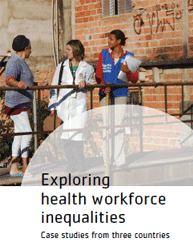Resource Spotlight: Exploring Health Workforce Inequalities: Case Studies from Three Countries
This research was initiated to promote statistical discourse on measuring inequalities in national health labor markets and the implications for policy and planning. With the aim of arriving at a better understanding of specific dimensions of health workforce inequalities in their national contexts, three case-studies are presented from selected countries. The case-studies, each of which uses different analytical approaches and data sources, were undertaken by HRH researchers in Ethiopia, Brazil and Mexico. The document concludes with a discussion of the practical implications of the results.
The Ethiopian case study explored different measures for assessing geographical accessibility to health-care providers. The Brazilian case study found that the health sector is characterized by inequalities in labour conditions, resulting in limited opportunities for professional advancement among those initially recruited in a mid-level health technical occupation. In Mexico, graduates of health professions education programs, from medical school to technical health services studies, are unable to put into practice the knowledge and skills acquired during their training, resulting in a labor "wastage." [from author]
View this resource.
The HRH Global Resource Center has other resources on this topic including:
For additional resources on this topic, visit the Workforce Assessment and Workplace Issues subject categories.
Past Resource Spotlights
- 2472 reads





